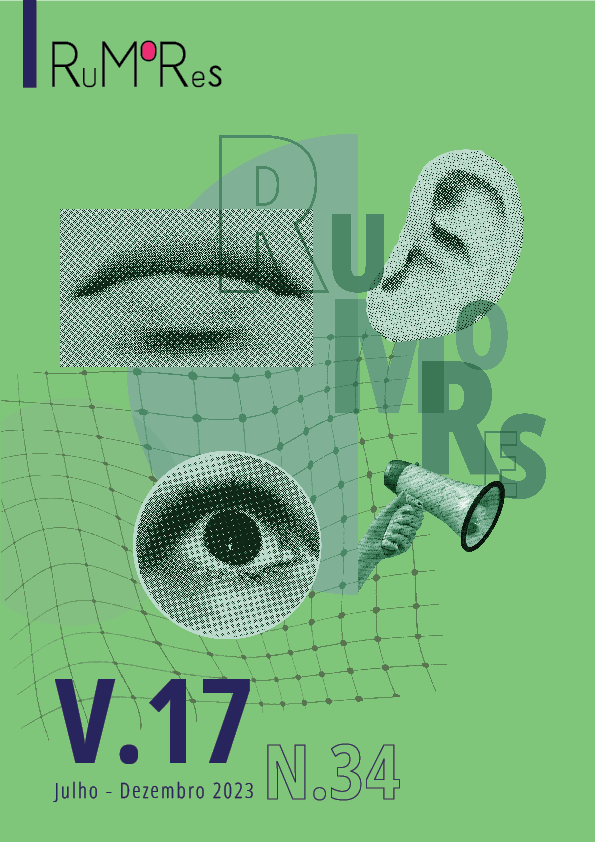Copying The Man who Copied: intertextuality, fragments and authorship
DOI:
https://doi.org/10.11606/issn.1982-677X.rum.2023.214830Keywords:
Narrative, Audio-visual, Intertextuality, Jorge FurtadoAbstract
This article addresses the issue of copying in the context of the debate about notions such as authorship, originality, and loss of centrality of the figure of the author based on the discovery of the existence of an unauthorized adaptation involving the Indian film “Currency” (2009), directed by filmmaker Swathi Bhaskar, and the Brazilian feature film “O Homem que Copiava” (2003), scripted and directed by Jorge Furtado. From the resumption of intertextual issues contained in Furtado’s work and the director’s well-known relationship with the literary canon, we intend to discuss the fragment and montage contemplated in the Brazilian work. It also analyzes the mise en abyme that goes beyond the fictional circuit in the face of Jorge Furtado’s ironic and playful reaction when he learns that a copier has plagiarized his film about a copier.
Downloads
References
BORGES, J. L. Ficções. São Paulo: Companhia das Letras, 2007.
BRESSANE, J. Entrevista concedida a Eduardo Miranda Silva. Rio de Janeiro, abr. 2010.
CALIL, R. Estreia nos EUA a “réplica” de “Psicose”. Ilustrada, Folha de S.Paulo, 4 dez. 1998. Disponível em: https://www1.folha.uol.com.br/fsp/ilustrad/fq04129814.htm. Acesso em: 1 fev. 2023.
ECO, U. Sobre os espelhos e outros ensaios. Rio de Janeiro: Nova Fronteira, 1989.
FIGUEIREDO, V. L. F. de. Narrativas migrantes: literatura, roteiro e cinema. Rio de Janeiro: PUC-Rio: 7Letras, 2010.
FURTADO, J. O homem que copiava o homem que copiava. 11 nov. 2022. Facebook: jorge.furtado.52. Disponível em: https://www.facebook.com/jorge.furtado.52. Acesso em: 7 nov. 2023.
GOLDSMITH, K. Copiar é preciso, inventar não é preciso. Entrevista a Giselle Beiguelman. Revista Select, 27 set. 2011. Disponível em: https://bit.ly/3lvB3QI. Acesso em: 23 fev. 2023.
MACHADO, A. O sujeito na tela: modos de enunciação no cinema e no ciberespaço. São Paulo: Paulus, 2007.
MULVEY, L. Prazer visual e cinema narrativo. In: XAVIER, I. (Org.). A experiência do cinema. Rio de Janeiro: Graal, 1983.
O HOMEM que copiava. Direção: Jorge Furtado. Porto Alegre: Casa de Cinema de Porto Alegre: Globo Filmes, 2003. 1 fita de vídeo (123 min).
PERRONE-MOISÉS, L. Mutações da literatura no século XXI. São Paulo: Companhia das Letras, 2016.
SAMOYAULT, T. A intertextualidade. São Paulo: Aderaldo & Rothschild, 2008.
STAM, R. A literatura através do cinema: realismo, magia e a arte da adaptação. Belo Horizonte: UFMG, 2008.
VALENTE, E. Psicose de Gus Van Sant. Revista Contracampo, 31 jan. 2002. Disponível em: https://bit.ly/3yY7eLG. Acesso em: 7 fev. 2023.
VIEIRA, J. L. As tramas do olhar. In: PINHEIRO, M. (Org.). Alfred Hitchcock. Rio de Janeiro: Centro Cultural Banco do Brasil, 2013. Disponível em: https://bit.ly/40o3D5k. Acesso em: 5 fev. 2023.
Downloads
Published
Issue
Section
License
Copyright (c) 2023 Eduardo Miranda Silva

This work is licensed under a Creative Commons Attribution-NonCommercial-ShareAlike 4.0 International License.
Declaro a total e irrestrita cessão de direitos autorais sobre o texto enviado para publicação na Rumores – Revista Online de Comunicação, Linguagem e Mídias. Entendo que o conteúdo do artigo é de minha inteira responsabilidade, inclusive cabendo a mim a apresentação de permissão para uso de imagens, ilustrações, tabelas, gráficos de terceiros que, porventura, venham a integrá-lo.









